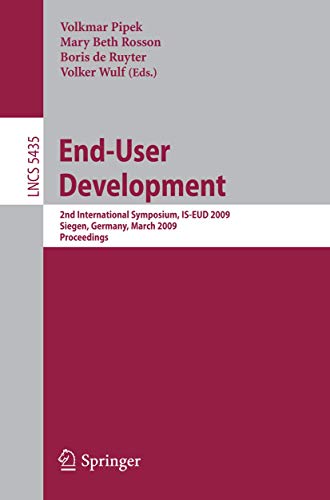Verwandte Artikel zu End-User Development: 2nd International Symposium,...
End-User Development: 2nd International Symposium, IS-EUD 2009, Siegen, Germany, March 2-4, 2009, Proceedings: 5435 (Lecture Notes in Computer Science) - Softcover

Inhaltsangabe
Book by None
Die Inhaltsangabe kann sich auf eine andere Ausgabe dieses Titels beziehen.
Reseña del editor
Work practices and organizational processes vary widely and evolve constantly. The technological infrastructure has to follow, allowing or even supporting these changes. Traditional approaches to software engineering reach their limits whenever the full spectrum of user requirements cannot be anticipated or the frequency of changes makes software reengineering cycles too clumsy to address all the needs of a specific field of application. Moreover, the increasing importance of ‘infrastructural’ aspects, particularly the mutual dependencies between technologies, usages, and domain competencies, calls for a differentiation of roles beyond the classical user–designer dichotomy. End user development (EUD) addresses these issues by offering lightweight, use-time support which allows users to configure, adapt, and evolve their software by themselves. EUD is understood as a set of methods, techniques, and tools that allow users of software systems who are acting as non-professional software developers to 1 create, modify, or extend a software artifact. While programming activities by non-professional actors are an essential focus, EUD also investigates related activities such as collective understanding and sense-making of use problems and solutions, the interaction among end users with regard to the introduction and diffusion of new configurations, or delegation patterns that may also partly involve professional designers.
Contraportada
This book constitutes the refereed proceedings of the 2nd International Symposium on End User Development, IS-EUD 2009, held in Siegen, Germany in March 2009.
The 12 revised full papers presented together with 2 invited talks and 2 refereed notes were carefully reviewed and selected. The papers report latest advances in the field of "End User Development" (EUD) such as collective understanding and sense-making of use problems and solutions, the interaction among end users with regard to the introduction and diffusion of new configurations, or delegation patterns that may also partly involve professional designers.
„Über diesen Titel“ kann sich auf eine andere Ausgabe dieses Titels beziehen.
- VerlagSpringer
- Erscheinungsdatum2009
- ISBN 10 3642004253
- ISBN 13 9783642004254
- EinbandTapa blanda
- SpracheEnglisch
- Anzahl der Seiten296
- HerausgeberPipek Volkmar, Rosson Mary-Beth, Wulf Volker
EUR 9,95 für den Versand von Deutschland nach USA
Versandziele, Kosten & DauerNeu kaufen
Diesen Artikel anzeigenEUR 14,25 für den Versand von Vereinigtes Königreich nach USA
Versandziele, Kosten & DauerSuchergebnisse für End-User Development: 2nd International Symposium,...
End-User Development
Anbieter: Biblios, Frankfurt am main, HESSE, Deutschland
Zustand: Used. pp. x + 285. Artikel-Nr. 18465361
Anzahl: 1 verfügbar
End-User Development: 2nd International Symposium, IS-EUD 2009, Siegen, Germany, March 2-4, 2009, Proceedings (Lecture Notes in Computer Science, 5435)
Anbieter: Ria Christie Collections, Uxbridge, Vereinigtes Königreich
Zustand: New. In English. Artikel-Nr. ria9783642004254_new
Anzahl: Mehr als 20 verfügbar
End-User Development : 2nd International Symposium, IS-EUD 2009, Siegen, Germany, March 2-4, 2009. Proceedings
Anbieter: AHA-BUCH GmbH, Einbeck, Deutschland
Taschenbuch. Zustand: Neu. Druck auf Anfrage Neuware - Printed after ordering - Work practices and organizational processes vary widely and evolve constantly. The technological infrastructure has to follow, allowing or even supporting these changes. Traditional approaches to software engineering reach their limits whenever the full spectrum of user requirements cannot be anticipated or the frequency of changes makes software reengineering cycles too clumsy to address all the needs of a specific field of application. Moreover, the increasing importance of 'infrastructural' aspects, particularly the mutual dependencies between technologies, usages, and domain competencies, calls for a differentiation of roles beyond the classical user-designer dichotomy. End user development (EUD) addresses these issues by offering lightweight, use-time support which allows users to configure, adapt, and evolve their software by themselves. EUD is understood as a set of methods, techniques, and tools that allow users of software systems who are acting as non-professional software developers to 1 create, modify, or extend a software artifact. While programming activities by non-professional actors are an essential focus, EUD also investigates related activities such as collective understanding and sense-making of use problems and solutions, the interaction among end users with regard to the introduction and diffusion of new configurations, or delegation patterns that may also partly involve professional designers. Artikel-Nr. 9783642004254
Anzahl: 2 verfügbar
